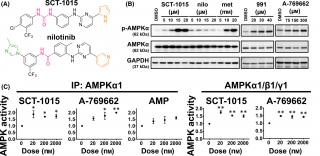Mar, 2022

Hepatocellular carcinoma (HCC) is characterized by rapid growth, early vascular invasion, and high metastasis. Currently available US Food and Drug Administration (FDA)-approved drugs show low therapeutic efficacy, limiting HCC treatment to chemotherapy. We designed and synthesized a novel small molecule, SCT-1015, that allosterically activated adenosine monophosphate-activated protein kinase (AMPK) to suppress the aerobic glycolysis in HCC. SCT-1015 was shown to bind the AMPK α and β-subunit interface, thereby exposing the kinase α domain to the upstream kinases, resulting in the increased AMPK activity. SCT-1015 dramatically reduced HCC cell growth in vitro and tumor growth in vivo. We further found that AMPK formed protein complexes with hypoxia-inducible factor 1-alpha (HIF1α) and that SCT-1015-activated AMPK promoted hydroxylation of HIF1α (402P and 564P), resulting in HIF1α degradation by the ubiquitin-proteasome system. With declined HIF1α abundance, many glycolysis-related enzymes were downregulated, suppressing aerobic glycolysis, and promoting oxidative phosphorylation. These results indicated that SCT-1015 channeled HCC cells into an unfavorable metabolic status. Overall, we reported SCT-1015 as a direct activator of AMPK signaling that held therapeutic potential in HCC.